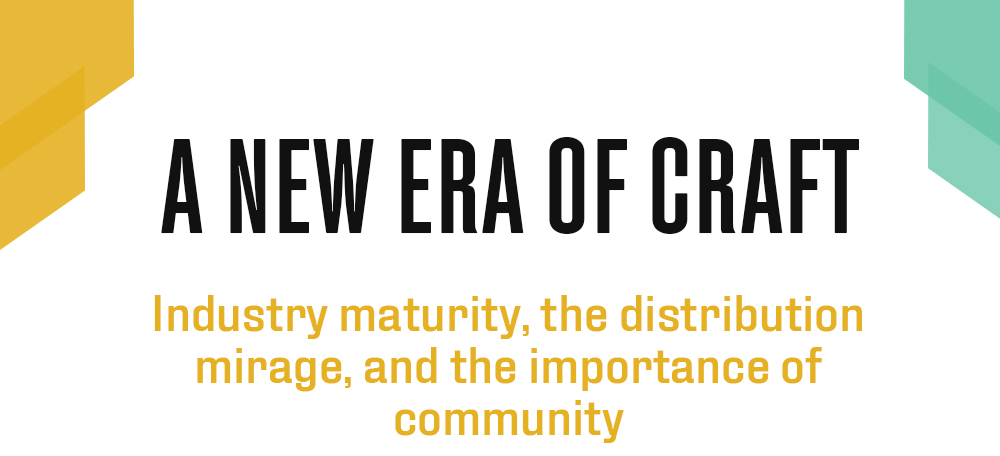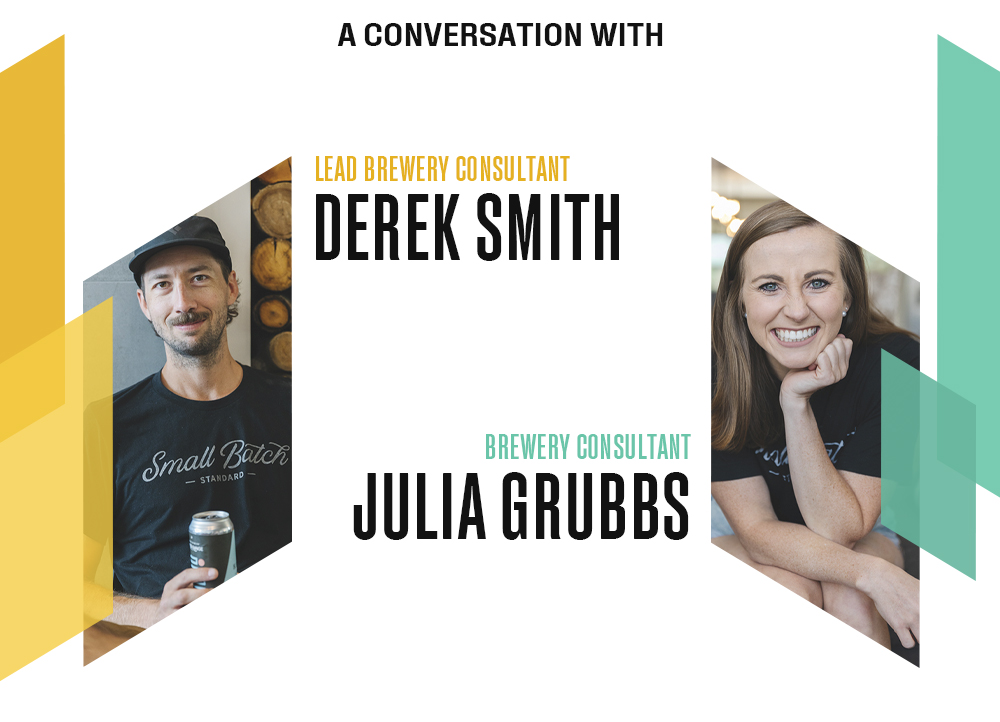

We sat down with our brewery consultants, Derek Smith and Julia Grubbs, for a deep dive into their recent experience presenting at the California Craft Beer Summit and the New York State Brewers Conference.
DEREK: California was an amazing experience. I got to meet a lot of great people in the industry and see what’s going on in the California craft scene. I went to some cool breweries and parties and gave a killer Small Batch Standard presentation.
JULIA: It was great. Everything I do with our clients on a daily basis, I got to share with others in the industry, and it was nice to know that the conversation and presentation resonated with them.
And New York is my home territory, so being able to more intimately interact with breweries in the state was nice. It was great to be outside of the city and see that there’s a lot of brewing happening in New York.
DEREK: I was most excited to share the benchmarking because that’s what the audience seems most interested in. It feels like that’s what they find most valuable because they’re able to see, through all the clients that we work with, that these are standards and goals that other breweries can hit.
JULIA: Yeah, and I think along with the benchmarks, mentioning either a case study from a client we’ve worked with or sharing our own experience to validate what we’re saying is just as important.
JULIA: I would have to say keep your community, talk to other people, see what else is going on. Help each other out and work together for collaborations, ideas, and inspiration. And then keep a pulse on what’s working and what’s not working.
Other than that: taproom, taproom, taproom.
DEREK: Yeah, I’m going to be broken record here and just say: taproom, taproom, taproom. We have so many clients that think distribution is going to save them.
DEREK: So many breweries are just seeing dollars flow into their account through wholesale and self-distro income, without realizing the margin side of it.
When breweries start to see how far distribution might be dragging them down and how tight those margins are and how hard it is to be profitable, I think it’s gonna resonate really well with a lot of breweries and kind of raise the red flag to them and say, “You gotta do something different because this is gonna crush you.”
JULIA: Taproom is where the money is and that’s where you have to focus. And if you’re not focused, then you’re not gonna actually achieve what you want because there’s too much energy going elsewhere.
And I think that ties into the Long Game talk that Chris has been preaching. You really got to put blinders on to be able to see what’s going on. You need to have that touch on the industry, sure, but you really need to know what’s going on inside your own brewery.
DEREK: If I’m going to be really positive, I’m going to say: They want to share their beer with everyone in the world and they want everyone to experience this wonderful product that they’ve made.
And if I’m going to be more cynical, I’m going to say: They are letting the egos get ahead of them and they’re saying, “Well, if I expand in seven markets, then I’ve ‘made it’ with my brewery!”
JULIA: Basically distribution is valuable in getting your name out there, but without the taproom, your profits are going to be slimmer. There’s a belief that there will be continued demand without focusing on the local community. And I feel like that connects with an article that Derek did awhile back: Own Your Backyard.
And that was touching on distro too, right? You want to make sure you’re succeeding in the distro market that surrounds you before expanding.
DEREK: Yeah, that’s a great point. If you want to look at distribution like advertising, then cool. Put some SKUs out in the market, get people familiar with you.
But looking at one of our clients who is one of the tightest operators, they’re making around 32% in the taproom and they’re making 5% in distribution. It’s just that wide of a margin swing.
DEREK: Someone came up to me after the talk and I was surprised with their candor of saying, “We’re this killer brand and everyone knows and loves us. And we’re bleeding money and no one knows that.” And it’s like, yeah, I get it. They were very interested in how to turn things around, how to make a profit, and how to run a profitable business.
JULIA: In the presentation we touch on beer vs. food sales. There was a whole discussion during the Q&A about food trucks (being unreliable) vs. having a full kitchen. And there were people responding and saying that they didn’t want to be in the food industry.
And, it’s like, sorry…you are kind of already in that industry. It’s the food and beverage industry. And I think going forward with the trends we are seeing, it is going to be important to invest heavily in food.
It touches back to something Chris has said for awhile: “Everyone has to eat, no one has to drink.”
DEREK: Very much so. One of the slides is about the complexity of the brewing industry and how you’re not just running one or two business centers, you’re running up to seven.
And I think given that complexity and given how hard it is to manage each portion, people just ate up this kind of information and it gave them a much better understanding of how to look at and manage their own businesses.
JULIA: We’re not in that boom that craft beer had 10 to 20 years ago, you know. It’s a mature market and we’re in a transition. You can’t just put your finger to the wind and hope for the best, right? You actually have to control what’s going on in your business. You have goals to hit in order to see the success that you want.
The chief economist of the BA presented before me and it was nice to hear that the points he was bringing up and the trends that he sees possibly on the horizon are going to make what we do at Small Batch Standard so much more valuable.
It’s just a different state and time in the industry. And I think what we’re doing is relevant at this turning point. And even more so in the years to come.
JULIA: I would just say that like any other industry, it’s cyclical in nature. Hello, tech layoffs. Tech’s rapid growth exceeded what was actually sustainable in the long-term because there was this forecasting of continual growth.
I think craft beer is going through the same thing. It’s leveling off and maybe even shrinking a tiny bit, but is there the potential for it to grow again? Absolutely.
DEREK: Yeah, I think the saturation is a big issue, which also can be opportunity for some. I was recently back in Texas where we lived for a while. And when we lived there, we basically had no breweries in a city of 250,000. And in the past eight years alone, they now have three or four.
If you are in a craft beer desert, if you’re in a place that’s not already saturated with breweries, then you have some opportunity. If you’re trying to start in somewhere like Denver or Portland or Seattle, you’re in a dogfight and good luck.
But, you know, there are gonna be a lot of breweries closing down in the next few years. And a lot of brands buying other brands and I think there will be opportunities when the dust settles for some of that growth in the already somewhat saturated markets.
I also think it’s people not knowing what 21 to 30 year olds are drinking because they’re not really drinking craft beer. In the next 10 years, is that gonna change? Are they going to get into craft beer? And if so, there’s going to be growth there.
JULIA: Yeah, and that innovation might come from just the beverage aspect of the brewery and it might not.
DEREK: And with the innovation, the ability to pivot and be flexible will also be key. Because seltzer’s came on hard for a couple years and now seltzer’s have dropped off a cliff and West Coast’s are back.
But it’s also very regional. So, if you go to a young craft beer market, like Salt Lake, we stay five years behind the trends.
If the industry is focusing on West Coast IPAs in California right now, well, in 2028, we’re going to be really strong in West Coast IPAs over here.
It’s important to know what trends are coming, but also know your customer and the market and what’s going to play well with it.
DEREK: As a shameless plug, people are going to need us more than ever. More breweries, more people needing insight into their business and how it works. It means there is a need for a brewery-focused accounting agency like us.
JULIA: Yeah! And I think Small Batch Standard’s continued growth will only help as we’ll have a touch on more markets with more data to compile and analyze.
And I think, you know, as much as we are in an accounting agency, I think the consulting piece is going to be an unmatched service and might grow into not only just financial consulting, but maybe some market consulting since we’ll have a pulse on more areas.
DEREK: Completely. Market consulting, management consulting, financial consulting, all of it.
JULIA: And as far as the industry at-large is concerned, I think it’s the community aspect that will always be important. Businesses can and should focus on that, with each other locally and even nationally. That’s what helps keep something sustainable.